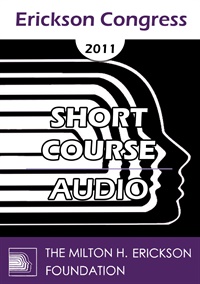
- Average Rating:
- Not yet rated
- Topic Areas:
- Animal Assisted Therapy | Psychotherapy | Short Courses
- Categories:
- Erickson Congress | Erickson Congress 2011
- Faculty:
- Dale Klein-Kennedy, LPCC
- Duration:
- 59:32
- Format:
- Audio Only
- Original Program Date:
- Dec 09, 2011
- Short Description:
- This workshop will explore the human-animal bond and its history and will define and describe the use of Animal-Assisted Therapy (AAT) and Equine-Assisted Psychotherapy (EAP in working with domestic violence survivors, child-witnesses, families, children at risk and populations not benefiting from traditional therapies. In addition to the information presented about this brief therapy, participants will have the opportunity to view a video of AAT and EAP sessions.
- Price:
- $15.00 - Base Price
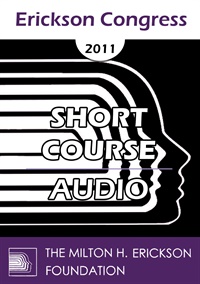
- Average Rating:
- Not yet rated
- Topic Areas:
- Short Courses | Brief Therapy | Couples Therapy | Psychotherapy | Intimacy | Relationships | Solution Oriented Approach
- Categories:
- Erickson Congress | Erickson Congress 2011
- Faculty:
- Robert Johansen, PhD | Ian Johansen, PhD | Todd Gaffney, PhD
- Duration:
- 41:06
- Format:
- Audio Only
- Original Program Date:
- Dec 09, 2011
- Short Description:
- The presentational will introduce a new and brief cognitive model for treating couples. It is a solution-focused model that proposes specific steps on how to differentiate types of love and how these impact an intimate relationship. The participants will develop strategies on how to effectively manage needs in an intimate relationship.
- Price:
- $15.00 - Base Price
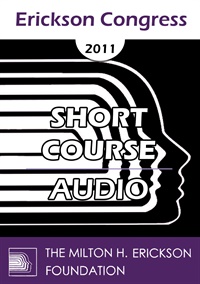
- Average Rating:
- Not yet rated
- Topic Areas:
- Ericksonian Psychotherapy | Psychotherapy | Short Courses | Ericksonian Hypnosis and Therapy Techniques | Femininity
- Categories:
- Erickson Congress | Erickson Congress 2011
- Faculty:
- Maria Escalante de Smith, MA
- Duration:
- 1:22:02
- Format:
- Audio Only
- Original Program Date:
- Dec 09, 2011
- Short Description:
- When women face unexpected pregnancies, they may experience a variety of feelings. Ericksonian techniques can help them consider alternatives. Short crises interventions such as future rehearsal and utilization will also be discussed as Ericksonian tools to be used during single session therapy. Participants will be able to discuss different alternatives such as adoption and ways to help keep their baby will be promoted. Age regression for coping with post-abortion syndrome will be described.
- Price:
- $15.00 - Base Price
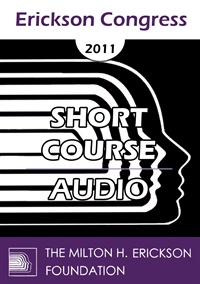
- Average Rating:
- Not yet rated
- Topic Areas:
- Short Courses | Ericksonian Hypnosis and Therapy Techniques | Ericksonian Psychotherapy | Hypnosis | Psychotherapy | Gambling | Dissociation
- Categories:
- Erickson Congress | Erickson Congress 2011
- Faculty:
- Pantazis Iordanidis, MD, PhD
- Duration:
- 1:21:25
- Format:
- Audio Only
- Original Program Date:
- Dec 09, 2011
- Short Description:
- Pathological gambling is an impulse control disorder characterized by persistent and recurrent maladaptive gambling behavior. Hypnotic phenomena of absorption, dissociation and imaginative involvement seem to play a significant role in the persistence of gambling behavior. These capacities of the client can be utilized in effective treatment, using hypnosis.
- Price:
- $15.00 - Base Price
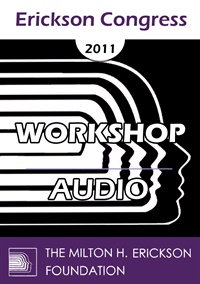
- Average Rating:
- Not yet rated
- Topic Areas:
- Consciousness | Psychotherapy | Workshops | Generative Psychotherapy
- Categories:
- Erickson Congress | Erickson Congress 2011
- Faculty:
- Stephen Gilligan, PhD
- Duration:
- 59 Minutes
- Format:
- Audio Only
- Original Program Date:
- Dec 07, 2011
- Short Description:
- The Generative Self approach emphasizes how the state of consciousness in which an experiential challenge is held determines whether a problem or solution develops. The model identifies three types of mind—Somatic, Cognitive, and Field—and how each mind can be operating at a Primitive, Ego, or Generative Level. We will see how a problem degrades a person’s consciousness level so that change is impossible, and how that low-level state can be improved to a Generative level, so that the problematic experience either spontaneously changes or is more easily engaged. Numerous practical techniques and clinical examples will be offered.
- Price:
- $20.00 - Base Price
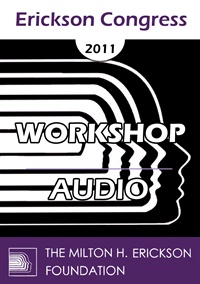
- Average Rating:
- Not yet rated
- Topic Areas:
- Workshops | Meditation, Spirituality and Yoga | Mind-Body | Psychotherapy
- Categories:
- Erickson Congress | Erickson Congress 2011
- Faculty:
- Richard Landis, PhD | Gary Ruelas, DO, PhD
- Duration:
- 59 Minutes
- Format:
- Audio Only
- Original Program Date:
- Dec 07, 2011
- Short Description:
- This workshop will show you how we can therapeutically bring about a transformational integration to our mind, body and spirit even at the molecular level. We will demonstrate how therapeutic intervention changes our cells and how this integration of self results in a natural balance, empowering harmony of the self, even in the face of great distress. Genetics do not have to determine our destiny. You will learn, as a holistic practitioner of integrative psychotherapy, how one can alter not only our perspectives and relationships but also our biology.
- Price:
- $20.00 - Base Price
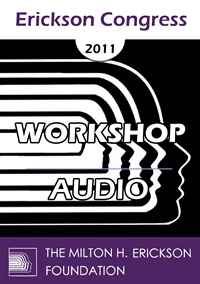
- Average Rating:
- Not yet rated
- Topic Areas:
- Hypnosis | Psychotherapy | Workshops | Ericksonian Hypnosis and Therapy Techniques | Ericksonian Psychotherapy | Pain and Healing | Metaphors
- Categories:
- Erickson Congress | Erickson Congress 2011
- Faculty:
- Teresa Garcia-Sanchez, MA
- Duration:
- 59 Minutes
- Format:
- Audio Only
- Original Program Date:
- Dec 07, 2011
- Short Description:
- Ericksonian psychotherapy and hypnosis treatment (done in conjunction with the latest advances in medicine) of a multiple sclerosis (MS) case will be reported. Ten years later, medical reports show 95% recovery based on the evidence of the scanned images that will be presented as well as patient’s feed-back videos and a full description of the development of the illness and treatment.
- Price:
- $20.00 - Base Price
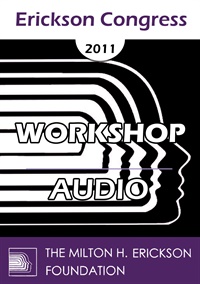
- Average Rating:
- Not yet rated
- Topic Areas:
- Psychotherapy | Grief | Workshops | Post-Traumatic Stress Disorder (PTSD) | Trauma
- Categories:
- Erickson Congress | Erickson Congress 2011
- Faculty:
- Woltemade Hartman, PhD
- Duration:
- 1 hour
- Format:
- Audio Only
- Original Program Date:
- Dec 07, 2011
- Short Description:
- Traditional intervention strategies to overcome traumatic grief reactions have in the past failed to achieve successful treatment outcomes. Dysregulation of affect and other central symptoms of acute stress disorder and PTSD are often the result of dissociative reactions to cope with the traumatic loss. This workshop will focus on grief as a resource, methods to facilitate the containment and transmutation of negative affect and how to integrate the deceased as an internal resource.
- Price:
- $20.00 - Base Price
Tags: Grief Psychotherapy PTSD Trauma
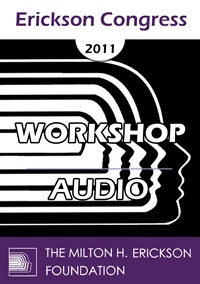
- Average Rating:
- Not yet rated
- Topic Areas:
- Psychotherapy | Workshops | Multicultural | Social Issues
- Categories:
- Erickson Congress | Erickson Congress 2011
- Faculty:
- Naji Abi-Hashem, PhD
- Duration:
- 59 Minutes
- Format:
- Audio Only
- Original Program Date:
- Dec 07, 2011
- Short Description:
- What is a modern definition or a contemporary conceptualization of care-giving and counseling? How are the events and trends of our world today shaping the nature and function of the helping professions? Presently, globalism, secularism, extremism, and radicalism constitute a major challenge to individuals, communities, and nations alike and to both the care-giver/therapist and the care-receiver/client! Trans-national, trans-theoretical, and trans-cultural implications will be discussed.
- Price:
- $20.00 - Base Price

- Average Rating:
- Not yet rated
- Topic Areas:
- Workshops | Psychotherapy | Worry
- Categories:
- Erickson Congress | Erickson Congress 2011
- Faculty:
- Steve Andreas, MA, NLP
- Duration:
- 59 Minutes
- Format:
- Audio Only
- Original Program Date:
- Dec 07, 2011
- Short Description:
- Since everyone makes mistakes and bungles opportunities, everyone experiences regret. However, while some people become paralyzed or depressed by regret, others easily “take it in their stride” and move on with their lives. Four different very rapid methods for regaining balance in regard to regret will be demonstrated and taught.
- Price:
- $20.00 - Base Price
Tags: Psychotherapy Worry
Please wait ...

